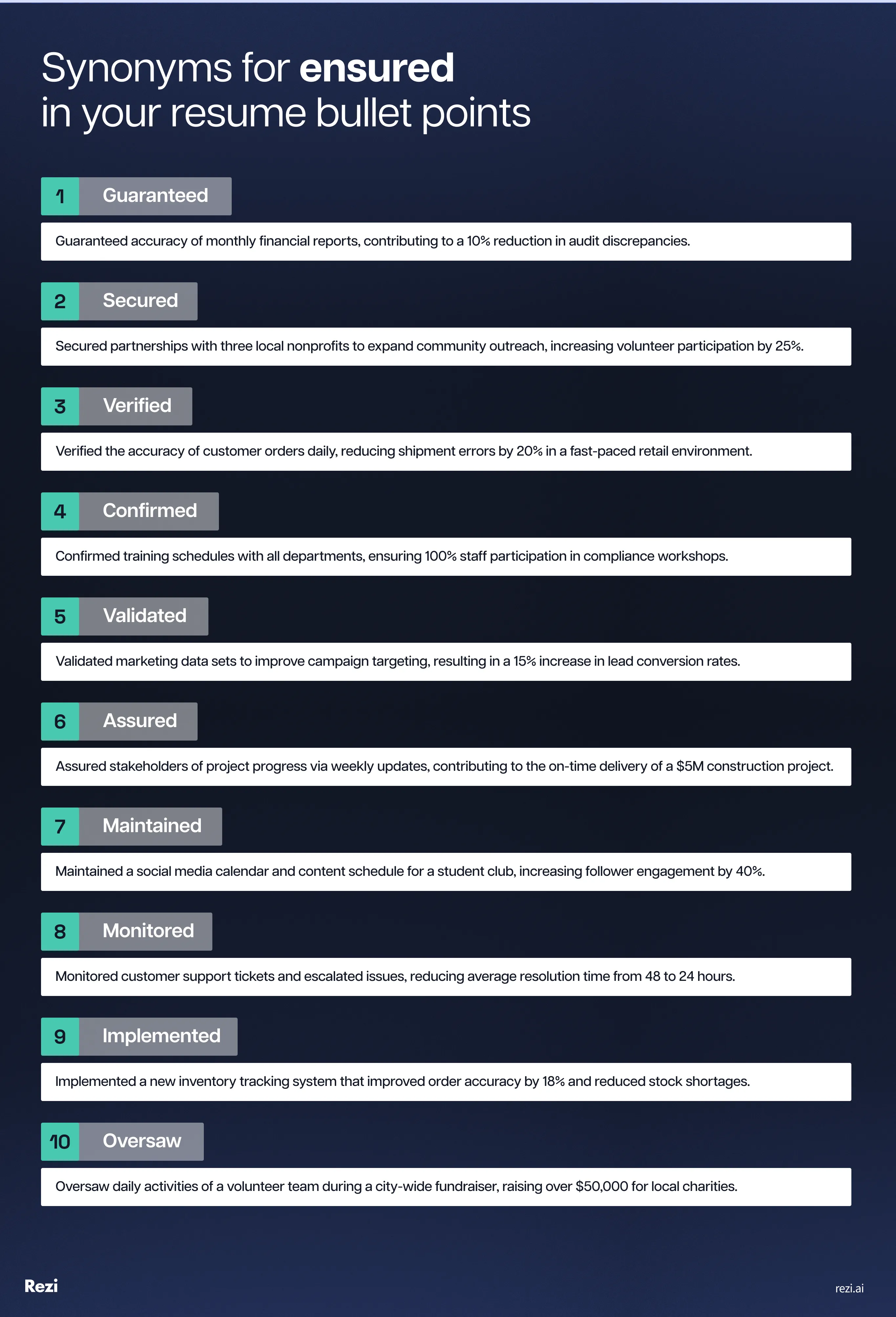Discover 25+ resume synonyms for “ensure” with examples tailored to various roles. Learn when to use “ensure” and when a stronger verb works better.



“Ensure” means to make certain something gets done or achieved. On a resume, it’s often used to show responsibility, reliability, and a proactive mindset — like making sure tasks are completed, standards are met, or outcomes are delivered. It’s useful, but if you use it too often, it can start to feel repetitive and less impressive.
That’s where this guide comes in. You’ll find:
- Strong alternatives to “ensure” that fit different contexts.
- Resume examples to show how the synonyms work in action.
- Tips on when it still makes sense to use “ensure.”
Need more help with your resume? Try the free Rezi AI Resume Builder, or check out these resources:
- How to Write a Survival Job Resume
- Reverse Chronological Resume (The Most Popular Format)
- All 25+ Resume Sections That You Could Use
- How to Target a Job Description With Your Resume
- Best Free Resume Templates & Tips
25+ Resume Synonyms for “Ensure”
“Ensure” is dependable — it signals that you took ownership and made sure things happened. But when it shows up too many times on a resume, it starts to lose its effect. Choosing sharper, more tailored verbs can help you highlight your role more clearly and make your accomplishments pop.
Here’s a list of strong alternatives to “ensure”:
Below, you’ll find resume examples that put these synonyms into action. They’re tailored for a mix of entry-level and senior roles, and each one focuses on showing off your achievements.

How to Replace “Ensure” with Synonyms on Your Resume
Using a variety of precise verbs not only adds interest to your resume but also paints a fuller picture of how you worked, led, or solved problems. The right word can shift the focus from vague responsibility to real action — and that’s what catches a hiring manager’s eye.
Let’s look at how you can level up your resume by replacing “ensure” with verbs that add depth and context.
Ascertained vs. Ensured
“Ascertained” shows active investigation and discovery, making it clear you didn’t just passively confirm specs — you dug in, collaborated, and made sure requirements were truly understood before launch.
“Ensured we had the correct project specs before launch.”
“Ascertained technical requirements through cross-functional reviews and stakeholder interviews.”
Affirmed vs. Ensured
“Affirmed” adds a layer of confidence and verification by highlighting the deliberate double-checking process, showing thoroughness critical in healthcare settings.
“Ensured proper medication was administered to patients.”
“Affirmed dosage accuracy and treatment alignment by double-checking prescriptions with physicians daily.”
Certified vs. Ensured
“Certified” implies a formal, official validation that reduces risk, making your role sound more authoritative and tied to compliance and accountability.
“Ensured event vendors were legitimate.”
“Certified vendor credentials and insurance coverage before contract approval, minimizing liability.”
Controlled vs. Ensured
“Controlled” suggests hands-on management and precise oversight — especially with budgets. You didn’t just follow financial limits, you enforced them, reflecting strong financial discipline and a proactive approach to resource management.
“Ensured budget limits were respected.”
“Controlled project spending to stay within 5% of the allocated budget.”
Drove vs. Ensured
“Drove” highlights initiative and momentum — you didn’t just keep things moving, you moved them forward. It also gives a subtle nod to your leadership style, hinting that you motivated others and took charge to achieve meaningful results.
“Ensured high levels of team productivity.”
“Drove team performance through goal setting, coaching, and real-time feedback.”
Enforced vs. Ensured
“Enforced” signals authority and rule application, and adding the 20% reduction shows real, measurable impact from your actions.
“Ensured team followed safety protocols on site.”
“Enforced strict safety procedures, reducing incidents by 20%.”
Facilitated vs. Ensured
“Facilitated” makes your role sound more hands-on and influential. It emphasizes that you took initiative, coordinated things, and helped everything run more efficiently.
“Ensured smooth onboarding of new hires.”
“Facilitated onboarding process for 15+ new hires, improving ramp-up time by 30%.”
Guaranteed vs. Ensured
“Guaranteed” comes across as more confident and assertive, especially when paired with automation — it shows you created a dependable system that kept payments on time without fail.
“Ensured all invoices were paid on time.”
“Guaranteed timely vendor payments by automating invoice tracking and setting up reminders.”
Maintained vs. Ensured
“Maintained” implies ongoing care and consistency, backed by a clear satisfaction metric, which makes the achievement more concrete and credible.
“Ensured customer satisfaction through timely responses.”
“Maintained a 95% customer satisfaction rating by resolving inquiries within 24 hours.”
Monitored vs. Ensured
The use of “monitored” here conveys oversight and ongoing vigilance — you were hands-on in keeping compliance intact.
“Ensured compliance with internal policies.”
“Monitored team activities to maintain 100% compliance with company policies.”
Oversaw vs. Ensured
“Oversaw” suggests a leadership role in managing workflows and teams, making the responsibility and scale clearer.
“Ensured consistent product quality.”
“Oversaw production workflows to maintain product quality across 3 manufacturing lines.”
Promoted vs. Ensured
“Promoted” shows you encouraged and fostered communication, rather than just passively making sure it happened.
“Ensured effective communication across teams.”
“Promoted cross-functional collaboration through weekly syncs and shared project dashboards.”
Safeguarded vs. Ensured
“Safeguarded” adds a protective, security-focused tone that highlights the importance of your role in preventing data breaches or leaks.
“Ensured secure handling of client data.”
“Safeguarded sensitive client information by implementing encryption and access protocols.”
Validated vs. Ensured
“Validated” is a better choice because it emphasizes you were directly involved in testing and confirming the software’s quality — not just making sure standards were met.
“Ensured software met quality standards before deployment.”
“Validated software functionality through rigorous testing to meet QA standards.”
Verified vs. Ensured
“Verified” shows attention to detail, as you caught and corrected errors. Backing up with a measurable result makes the impact clearer and more compelling than simply saying you “ensured” accuracy.
“Ensured accurate data entry.”
“Verified and corrected data input, improving database accuracy by 25%.”
Best “Ensure” Synonym Examples
We’ve put together some of the strongest alternatives to “ensure” that you can easily swap into your resume to make your achievements stand out. Each word brings its own strength, helping your experience feel more specific and impressive.
1. Guarantee
“Guarantee” packs a punch because it promises a result with confidence. It shows you deliver on your commitments, which works especially well in fields like finance, logistics, or customer service — anywhere trust and reliability are key.
Examples:
• Guaranteed on-time delivery of 99% of customer orders in a high-volume warehouse.
• Guaranteed compliance with federal regulations during quarterly audits.
• Guaranteed consistent quality in volunteer event planning, ensuring positive participant feedback.
If you’re in customer service, check out the Top Customer Service Skills to Put on a Resume.
2. Secure
“Secure” suggests you protected or obtained something valuable. It implies determination and responsibility, making it perfect for roles in cybersecurity, sales, real estate, or project management where locking down resources or data is critical.
Examples:
• Secured $1M in new client contracts over two years through strategic negotiations.
• Secured confidential data by implementing advanced encryption.
• Secured sponsorships for student organization events, increasing funding by 40%.
3. Verify
When you use “verify,” it highlights your careful attention to detail and commitment to accuracy. It fits great with quality assurance, auditing, finance, and research, where fact-checking matters most.
Examples:
• Verified vendor compliance with contracts, avoiding service disruptions and saving 15% in costs.
• Verified data entries daily, cutting errors by 30%.
• Verified participant eligibility for nonprofit program enrollment.
4. Confirm
“Confirm” is about making sure everything is set and clear. It shows you took steps to double-check details and keep everyone aligned — essential for customer service, administration, and coordination roles.
Examples:
• Confirmed appointment schedules with clients to reduce no-shows by 15%.
• Confirmed project deliverables with stakeholders to align goals.
• Confirmed attendance and logistics for volunteer events, ensuring smooth operations.
Learn how to highlight the most effective Communication Skills for Your Resume.
5. Validate
Using “validate” proves you back up your work with data, testing, or proof. It’s ideal for tech, engineering, science, and QA positions where logic and evidence matter.
Examples:
• Validated software features through rigorous testing cycles.
• Validated survey data for accuracy before analysis.
• Validated research findings in senior thesis project with peer reviews.
6. Assure
“Assure” conveys confidence and reassurance, often aimed at calming or supporting others. It fits well in leadership, customer service, and client-facing roles.
Examples:
• Assured clients of project progress with regular updates.
• Assured quality standards were met across multiple production teams.
• Assured new volunteers felt supported during training sessions.
7. Maintain
“Maintain” implies steady, ongoing effort to keep things running smoothly or at a high standard. It’s a go-to for operations, facilities, IT, or any role focused on consistency and reliability.
Examples:
• Maintained student club membership and engagement throughout presidency.
•Maintained production equipment to ensure optimal performance and minimize downtime.
• Maintained detailed project documentation for smooth team handoffs and collaboration.
8. Monitor
“Monitor” highlights vigilance and proactive oversight, as you check progress regularly to catch problems early. It fits healthcare, IT, compliance, and project management perfectly.
Examples:
• Monitored network security to detect and prevent cyber threats.
• Monitored team performance metrics and provided coaching to boost performance.
• Monitored safety procedures during large fundraising events.
9. Implement
“Implement” focuses on taking action — putting plans or systems into place. It shows you can drive change and improvements, great for project management, operations, or IT.
Examples:
• Implemented a new CRM system that increased sales team efficiency by 20%.
• Implemented COVID-19 safety protocols across multiple office locations.
• Implemented fundraising campaigns for campus charities.
10. Oversee
“Oversee” signals leadership and accountability by managing teams or projects. It’s ideal for managers, operations leads, and coordinators.
Examples:
• Oversaw a 10-person team delivering software projects on time and under budget.
• Oversaw inventory management, reducing waste by 15%.
• Oversaw logistics and volunteer coordination for community outreach events.
When You Should Still Use “Ensure” in Your Resume
Sometimes, “ensure” really is the right word — especially when you want to emphasize that you took responsibility for making something happen. But in other cases, a more specific verb can bring clarity and impact to your achievements.
Here’s how to use “ensure” and its alternatives:
- Stick with “ensure” when the focus is on accountability and results. It’s perfect for showing that you upheld standards, followed through, or made sure critical tasks got done. For example: “ensured compliance with safety protocols.”
- It fits especially well in fields where consistency and adherence matter. In healthcare, manufacturing, finance, education, and operations, “ensure” highlights responsibility without needing extra explanation.
- Keep it simple for clear, direct actions. If you’re describing tasks like meeting deadlines, following procedures, or completing required steps, “ensure” does the job without sounding overengineered.
- Reach for a more specific verb when you want to describe the how. Words like “monitored,” “enforced,” or “implemented” can paint a clearer picture of the actions you took.
- Avoid “ensure” if you’re emphasizing leadership or strategic work. Verbs like “led,” “drove,” or “executed” better convey initiative, influence, and high-level decision-making.
- In student, volunteer, or entry-level roles, “ensure” can demonstrate reliability. Just back it up with context or results, like “ensured smooth check-in process for over 100 attendees at campus events.”
- Always tie it to a concrete outcome. Whether you use “ensure” or a synonym, show what happened as a result — ideally with metrics like time saved or results improved.
Find out how to highlight your accomplishments on your resume to make a stronger impression.
FAQ
What is a synonym for ensured success?
It depends on your role and how hands-on you were. If you led the charge, something like “drove success” or “spearheaded outcomes” fits well. If you were more focused on execution, try “delivered results” or “secured positive outcomes.” For support roles, you might say you “facilitated success” or “contributed to successful outcomes.”
What is a synonym for the word ensure compliance?
Strong alternatives include “enforced compliance,” “monitored adherence,” or “upheld regulatory standards.” “Enforced” implies you took steps to make sure policies were followed, while “monitored” suggests ongoing vigilance. “Upheld” is great for emphasizing your personal responsibility in maintaining standards.
What is a buzzword on a resume?
Buzzwords are overused phrases that sound fancy but don’t say much, like “go-getter” or “results-oriented.” People throw them in to sound impressive, but hiring managers see right through them. Instead of saying you’re a “team player,” describe how you actually worked with others to get things done. Swap vague terms for real examples and action verbs.
Explore the Top 30 Weakest Action Verbs From Over 100,000 Resumes.
What are common mistakes that people make when writing, organizing, and formatting a resume?
A big mistake is making your resume hard to scan — dense text, a cluttered layout, or inconsistent formatting can lose attention fast. Avoid listing job duties without showing your results (and use metrics when possible). And always tailor your resume to each role instead of sending the same version everywhere.
What words should I include in my resume?
Choose action verbs that highlight how you made a difference, like “led,” “implemented,” “developed,” “streamlined,” “collaborated,” and “improved.” These help paint a clear picture of what you did. Also, pull relevant keywords from the job description — they help with ATS and show you’re speaking the employer’s language.



